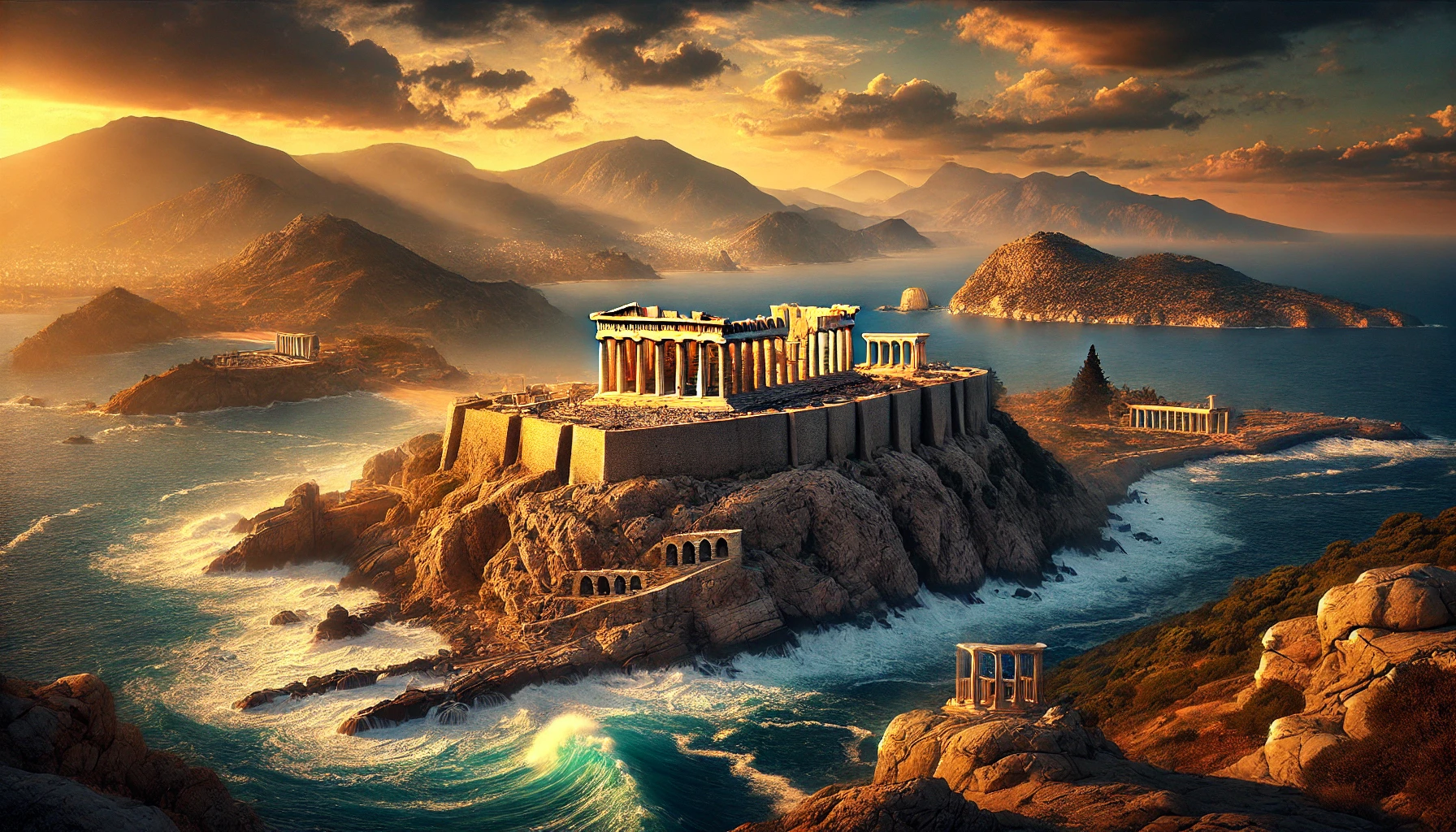
Disclaimer: This content was generated using AI. While I strive for accuracy, I encourage readers to verify important information. I use AI-generated content to increase efficiencies and to provide certain insights, but it may not reflect human expertise or opinions.
Greece, the cradle of Western civilization, is a land steeped in history and mythology. From the grandeur of ancient temples to the mystique of sacred sites, this country is a living museum, offering visitors a journey through time. Whether you’re an avid history buff or simply a traveler seeking to immerse yourself in the cultural richness of Greece, the nation’s historical monuments are a must-see. In this article, we will guide you through some of the most impressive historical landmarks that Greece has to offer.
The Acropolis of Athens: The Pinnacle of Ancient Greek Architecture
When one thinks of Greece, the image of the Acropolis towering over Athens immediately comes to mind. This iconic symbol of ancient Greece is not just a testament to the architectural genius of the ancient Greeks, but also a reminder of the rich cultural heritage that has influenced Western civilization.
The Acropolis, meaning “high city” in Greek, was originally constructed as a fortress and later transformed into a sacred site dedicated to Athena, the city’s patron goddess. The most famous structure on the Acropolis is the Parthenon, a temple dedicated to Athena Parthenos. Built between 447 and 438 BC, the Parthenon is renowned for its Doric columns and intricate sculptures, including the famous frieze that depicts the Panathenaic procession.
Visitors to the Acropolis are not only treated to a close-up view of these magnificent structures but also to panoramic views of Athens and its surroundings. The Acropolis Museum, located nearby, houses many of the artifacts and sculptures found on the site, providing further insight into the history and significance of this ancient landmark.
Delphi: The Oracle of the Ancient World
Nestled on the slopes of Mount Parnassus, the ancient site of Delphi was once considered the center of the world in Greek mythology. According to legend, Zeus released two eagles from opposite ends of the earth, and they met at Delphi, marking it as the omphalos, or navel, of the world. This sacred site was home to the Oracle of Delphi, where the priestess Pythia delivered prophecies that shaped the course of history.
The ruins of Delphi are spread across a vast area, including the Temple of Apollo, where the Oracle once resided. The temple, built in the 4th century BC, is surrounded by other significant structures such as the Treasury of the Athenians, the Theater, and the Stadium. Each of these structures offers a glimpse into the religious, cultural, and political life of ancient Greece.
Today, Delphi is a UNESCO World Heritage site and one of the most visited archaeological sites in Greece. The combination of its historical significance and the stunning natural beauty of its surroundings makes Delphi a destination that should not be missed.
The Temple of Poseidon at Cape Sounion: A Majestic Seaside Sanctuary
Perched on the edge of a cliff overlooking the Aegean Sea, the Temple of Poseidon at Cape Sounion is one of the most breathtaking historical monuments in Greece. Built in the 5th century BC, this temple was dedicated to Poseidon, the god of the sea, and served as a place of worship for sailors seeking safe passage across the treacherous waters of the Aegean.
The temple’s location at the southernmost tip of the Attica peninsula offers visitors stunning views of the sea and the surrounding landscape. The ruins of the temple, with its imposing Doric columns, are particularly striking at sunset, when the sky is painted in hues of orange and pink, creating a magical atmosphere.
In addition to its historical and architectural significance, Cape Sounion is also steeped in mythology. According to legend, it was from these cliffs that King Aegeus of Athens leaped to his death, giving the Aegean Sea its name. Today, the Temple of Poseidon is a popular destination for both history enthusiasts and nature lovers alike.
The Palace of Knossos: A Window into Minoan Civilization
The island of Crete is home to one of the most important archaeological sites in Greece: the Palace of Knossos. This ancient palace was the center of the Minoan civilization, which flourished from approximately 2000 to 1400 BC, making it one of the earliest civilizations in Europe.
The Palace of Knossos is a sprawling complex of rooms, corridors, and courtyards, spread over several levels. It is famous for its advanced architectural features, such as the use of light wells, drainage systems, and frescoes that adorned the walls. The most famous of these frescoes is the “Toreador Fresco,” which depicts a bull-leaping ceremony, a ritual believed to have been central to Minoan religious practices.
According to myth, Knossos was the home of King Minos and the site of the legendary Labyrinth, where the Minotaur was kept. While the labyrinth itself has never been found, the maze-like layout of the palace has led many to believe that it inspired the myth.
Today, the Palace of Knossos is a fascinating site to explore, offering visitors a glimpse into the daily life, culture, and beliefs of the Minoans. The nearby Heraklion Archaeological Museum houses many of the artifacts uncovered at Knossos, providing further context and understanding of this ancient civilization.
Olympia: The Birthplace of the Olympic Games
No visit to Greece would be complete without a trip to Olympia, the birthplace of the Olympic Games. Located in the western Peloponnese, Olympia was a major religious and athletic center in ancient Greece. The site is dedicated to Zeus, the king of the gods, and was home to one of the Seven Wonders of the Ancient World, the Statue of Zeus, a massive gold and ivory statue created by the sculptor Phidias.
The archaeological site of Olympia is vast and includes the remains of various temples, athletic facilities, and public buildings. The most significant structure is the Temple of Zeus, where the statue of Zeus once stood. The temple, built in the 5th century BC, is one of the largest and most impressive in Greece.
The site also includes the remains of the ancient stadium, where the Olympic Games were held every four years in honor of Zeus. Visitors can walk through the archway that once led to the stadium and imagine the excitement of the ancient games, which brought together athletes from all over the Greek world to compete for glory.
Today, Olympia is a UNESCO World Heritage site and a symbol of the enduring legacy of the Olympic Games. The Olympic flame, which is lit here every four years before the modern Games, serves as a reminder of the site’s historical significance.
The Meteora Monasteries: A Spiritual and Architectural Marvel
While not as ancient as some of the other sites mentioned, the monasteries of Meteora are nonetheless one of the most impressive historical landmarks in Greece. Located in central Greece, Meteora is a UNESCO World Heritage site famous for its monasteries perched atop towering rock pillars.
The name “Meteora” means “suspended in the air,” and it is an apt description for these monasteries, which seem to float above the landscape. The monasteries were built by Orthodox monks between the 14th and 16th centuries as a refuge from invading armies. Today, six of the original twenty-four monasteries remain, each offering a unique glimpse into the monastic life and the history of the Eastern Orthodox Church.
Visitors to Meteora can explore these monasteries, some of which are still inhabited by monks. The interiors are adorned with beautiful frescoes, icons, and religious artifacts, while the views from the monasteries offer breathtaking panoramas of the surrounding landscape.
Meteora is not only a place of religious and historical significance but also a site of natural beauty. The unique rock formations, combined with the serene atmosphere of the monasteries, make Meteora a destination that appeals to both the soul and the senses.
Epidaurus: The Ancient Theater and Healing Sanctuary
Epidaurus, located in the northeastern Peloponnese, is best known for its ancient theater, one of the best-preserved and most acoustically perfect theaters in the world. Built in the 4th century BC, the Theater of Epidaurus could accommodate up to 14,000 spectators and was used for dramatic performances that were an integral part of the healing rituals at the sanctuary.
The theater is part of the Sanctuary of Asclepius, the god of healing, which was one of the most important healing centers in the ancient world. Pilgrims came from all over Greece to seek cures for their ailments, participating in various rituals and treatments that combined both spiritual and physical healing.
Today, the Theater of Epidaurus is still in use and hosts performances during the annual Epidaurus Festival, where visitors can experience the magic of ancient Greek drama in its original setting. The sanctuary itself offers a fascinating insight into the ancient Greek approach to medicine and healing, with the ruins of temples, baths, and other facilities that were used in the treatment of patients.
Epidaurus is a place where history, art, and medicine converge, offering visitors a unique opportunity to explore the multifaceted aspects of ancient Greek culture.
Mystras: The Byzantine Gem of the Peloponnese
Mystras, a fortified town near Sparta in the Peloponnese, is one of the most significant Byzantine sites in Greece. Founded in the 13th century, Mystras was a major political, military, and cultural center during the Byzantine period, particularly in the 14th and 15th centuries when it served as the capital of the Despotate of the Morea.
The town is built on the slopes of Mount Taygetos and is surrounded by a series of walls and fortifications that reflect its strategic importance. The most impressive structures in Mystras are its churches and monasteries, which are adorned with stunning frescoes and mosaics that showcase the artistic achievements of the Byzantine Empire.
One of the highlights of Mystras is the Church of Agios Dimitrios, where the last Byzantine emperor, Constantine XI, was crowned in 1449. The church, along with others such as the Church of the Hodegetria and the Monastery of Pantanassa, offers a glimpse into the religious and cultural life of the Byzantine period.
Today, Mystras is a UNESCO World Heritage site and a popular destination for those interested in Byzantine history and architecture. The ruins of the town, set against the backdrop of the rugged Peloponnesian landscape, create a hauntingly beautiful atmosphere that transports visitors back in time.
Conclusion: A Journey Through Greece’s Rich Historical Heritage
Greece is a country where history comes alive at every turn. From the majestic ruins of the Acropolis in Athens to the serene monasteries of Meteora, the historical monuments of Greece offer a window into the past, allowing visitors to explore the civilizations, cultures, and legends that have shaped the world as we know it today.
Whether you are walking in the footsteps of ancient philosophers, standing in the shadows of monumental temples, or gazing out over the landscapes that inspired countless myths, Greece’s historical landmarks provide an unforgettable experience. These sites are not just remnants of a bygone era; they are living testimonies to the enduring legacy of human achievement, creativity, and belief.
So, as you plan your visit to Greece, be sure to include these incredible historical monuments in your itinerary. Each site offers its own unique story, waiting to be discovered by those who are willing to delve into the rich tapestry of Greece’s past.








